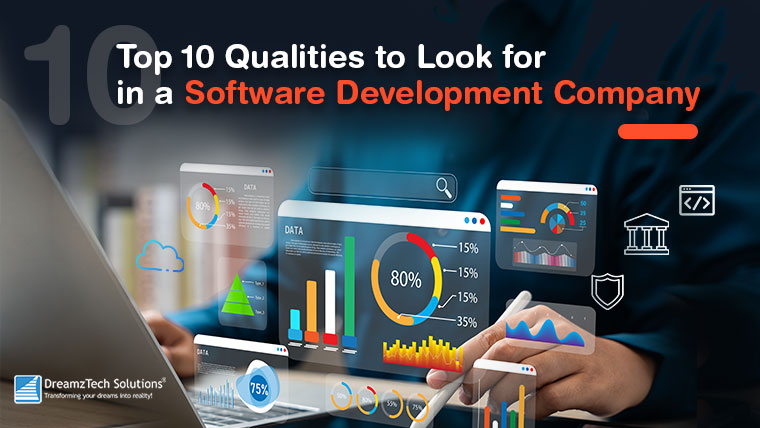In the rapidly evolving tech landscape of 2025, choosing the right software development partner can make or break your project. Below are the top 10 essential qualities every company should evaluate when selecting a software development firm:
- Technical Expertise & Technical Stack Mastery
- Robust Project Management & Delivery Discipline
- Strong Communication & Collaboration Skills
- Security & Compliance Know‑How
- Innovation & Adoption of Emerging Technologies
- Quality Assurance & Testing Rigor
- Scalable & Flexible Development Processes
- Transparent Pricing & Fair Contracts
- Client-Centric Culture & References
- Post‑Launch Support & Maintenance
1. Technical Expertise & Technical Stack Mastery
A software development company must possess deep technical knowledge and proven experience in your technology stack.
- Breadth and depth: For modern needs like AI integration, cloud-native apps, DevOps, and microservices, your partner should have engineers skilled across these disciplines.
- Track record: Ask for code samples, GitHub activity, open-source contributions, and case studies in relevant domains.
- AI proficiency: In 2025, AI-assisted development is mainstream—68% of developers report saving over 10 hours per week using AI tools, compared to only 46% last year ProofHub+2IT Pro+2TechRadar+2. A top-tier company will harness AI not just for coding, but for automation, analytics, and testing.
Tip: Request a technical audit or exploratory spike project to test their expertise.
2. Robust Project Management & Delivery Discipline
Projects flounder without strong management. In 2025, sound project discipline is even more vital as complexity grows.
- High failure rates: Around 70% of projects fail within their first year due to misaligned goals, poor planning, or inadequate resources .
- Core reasons: A “lack of defined objectives” leads to 37% of failures, while poor management accounts for 47% Jobstik.
- Agile maturity: Companies report that 77% of high-performing projects adopt PM software and formal practices ProofHub+3FounderJar+3monday.com+3.
What to look for:
- Agile tools and methodologies (Scrum, Kanban, CI/CD pipelines).
- Assigning a dedicated, certified project manager (PMP, CSM, SAFe).
- Clearly defined KPIs and regular status reporting.
- Example deliverables: project plans, sprint backlogs, release timelines.
3. Strong Communication & Collaboration Skills
Effective communication bridges the gap between developers, stakeholders, and users.
- Losses in development: Poor communication is costing teams 6–10 hours weekly in organizational inefficiencies TechRadar+15IT Pro+15Which Proxies+15Content Snare+14TechRadar+14TrueList+14HAY+1Proxify+1.
- Wide support: Every study emphasizes that communication is vital—from reducing errors and saving cost/time, to enabling seamless Agile delivery .
Must‑haves:
- Bilingual fluency: able to explain technical concepts in business terms.
- Established communication cadence: daily standups, weekly demos, stakeholder syncs.
- Collaboration triage: remote-friendly tools (Slack, Jira, Figma, etc.).
- Cultural fit: engagement, proactiveness, cross-geography coordination.
4. Security & Compliance Know‑How
By 2025, data breaches are no longer “if,” but “when.” Security and regulatory readiness are mandatory.
- Regulation complexity: GDPR, HIPAA, CCPA 2.0, SOC2, ISO27001—relevant regulations vary by geography and industry.
- Embedded security: Leading companies follow DevSecOps—shifting security left, automating testing, ensuring vulnerability scanning, and threat modeling.
Evaluation points:
- Ask for SOC2 or ISO27001 certifications, penetration testing reports.
- Ensure commitment to coding standards (OWASP ASVS, dependency checks, secure coding reviews).
- Legal safeguards: NDAs, IP ownership clauses, incident response plans.
5. Innovation & Adoption of Emerging Technologies
A top-tier development company should not just code it; they should innovate it.
- AI-powered gains: Developers saved over 10 hours per week through AI—but struggled for clarity IT Pro+1TechRadar+1.
- Cutting-edge tools: In 2025, solid companies use tools like Copilot, GitHub Actions, automated infrastructure staging, analytics monitoring, AIOps.
What to assess:
- Use of AI/ML frameworks (TensorFlow, PyTorch, Hugging Face) for value-add features.
- Embracing cloud-native tools (Kubernetes, serverless, infra-as-code).
- Embracing data pipeline and analytics architecture.
- Willingness to pilot new tools or open-source contributions.
6. Quality Assurance & Testing Rigor
Great companies bake quality assurance into every sprint.
- DevOps impact: CI/CD, automated testing, test-driven development (TDD), and performance regression pipelines are now industry norm.
- ISO 25010 and beyond: Code must not just run—it must scale, secure, and remain maintainable long-term.
Checklist:
- Mixed test strategies: unit, integration, UI, API, performance, security tests.
- Test coverage reporting tools (SonarQube, Coveralls).
- Secure delivery pipelines that block until tests pass.
- UAT involvement, build pipelines, staging environment reviews.
7. Scalable & Flexible Development Processes
Your project won’t stay the same—your vendor’s processes must evolve with you.
- Scalability matters: They should adapt from small MVPs to enterprise monolith replacements.
- Flexible resourcing: Ability to rapidly ramp engineers up/down, with clear onboarding/offboarding.
Indicators:
- Use of resource tracking tools.
- Proven success scaling in/out.
- Automated handoffs and documentation protocols.
- Portfolio alignment when managing multiple projects.
8. Transparent Pricing & Fair Contracts
Disputes arise when contracts cloud billing. Clarity upfront avoids fallout.
- Pricing models: Time & Material, Fixed Bid, Outcome-based (milestone payments).
- Cost control: Continuous monitoring, burn rate reporting, escalation protocols.
Ensure you get:
- Well-defined scope, inclusive/exclusive services.
- Change-management built in.
- Liability clauses—IP ownership, NDA, confidentiality, indemnifications.
- Trial/pilot option before full engagement.
9. Client‑Centric Culture & References
Past performance predicts future results.
- Client testimonials: Real quotes, detailed case studies, named references.
- Review sites: Good ratings on Clutch, G2, GoodFirms are critical due diligence.
- Cultural fit: Do they align with your values—e.g., remote-friendly, asynchronous collaboration, ownership mindsets?
What you can ask:
- For references in your domain (e.g., fintech, healthcare).
- Examples where they handled surprises or pivoted mid-project.
- Examples of long-term partnerships beyond initial engagement.
10. Post‑Launch Support & Maintenance
Your launch is just Day 1. Maintenance is the marathon.
- SLAs & incident response: Ensure availability (e.g., 99.9%), clear response/resolution windows.
- Continuous improvement: Retrospectives, performance monitoring, iterative enhancements.
- Technical debt management: Dedicated budget and cycles for refactoring.
Check for:
- Live monitoring and alerting infrastructure.
- Support team vs. dev team—clear handoff.
- Ongoing feature enhancements, A/B testing, analytics-driven iteration.
Why These Qualities Matter—And 2025 Context
- AI + Communication Paradox: Atlassian’s 2025 report shows AI saves ~10 hours/week, but 90% of developers still lose 6+ hours to poor coordination proprofsproject.comIT Pro+1TechRadar+1. This underscores the need to evaluate both tech skill and teamwork effectiveness.
- Project failure still high: With 70%+ of software initiatives failing due to mismanagement and lack of objectives Which Proxies+2Proxify+2IT Pro+2, PM maturity isn’t a luxury—it’s a lifeline.
- Underutilized PM tools: Only 23% of companies use PM software—leaving the rest vulnerable to chaos proprofsproject.com+4Which Proxies+4ProofHub+4. A modern vendor will not only use, but champion these tools.
- Communication still king: A raft of articles confirm it’s the #1 success factor—not just nice-to-have Proxify+3desmart.com+3LinkedIn+3.
Quick Evaluation Scorecard
| Quality Area | Checkpoint Questions |
|---|---|
| Technical Expertise | Recent case studies? Code samples? AI/Cloud stack depth? |
| Project Management | Certified PM led? Tools in use? Delivery history? |
| Communication | Language fluency? Meeting structure? Remote tools? |
| Security & Compliance | SOC2/ISO? Automated security scans? |
| Innovation | Do they pilot new tech? AI and DevOps adoption? |
| QA & Testing | Automated tests? Coverage tools? CI gates? |
| Scalability | Ramp-up ability? Documentation process? |
| Pricing & Contracts | Transparent billing? Clear change control? |
| References & Culture | Client testimonials? Staff retention? Cultural fit? |
| Support Post-launch | SLA defined? Monitoring? Budget for tech debt? |
Final Thoughts
In 2025, the bar for software development companies is higher than ever. No longer is raw coding talent sufficient—projects today demand a blend of:
- Cutting-edge technical skills (AI, cloud, DevOps)
- Disciplined delivery managed by strong PM
- Clear, proactive communication amid global teams
- Strong security & compliance foundations
- Continuous innovation mindset
- Rigorous QA built into every sprint
- Transparent pricing and collaborative culture
- Long-term support and maintenance commitment
When assessing a vendor, make your evaluation structured—leverage the scorecard above. Request pilot projects, reference calls, and documentation to validate their claims. A firm delivering on all ten qualities is not just a vendor—they’re a strategic partner who will help your software thrive long-term.
Ready to start your search? Feel free to ask for:
- A vendor shortlist based on your tech stack or industry
- Help drafting a detailed RFP that includes these criteria
- A sample scorecard template to evaluate vendors easily
Let me know how I can help!



